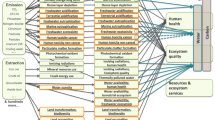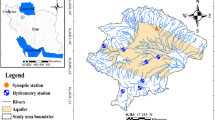Abstract
The use of computer models offers a general and flexible framework that can help to deal with some of the complexities and difficulties associated with the development of water management plans as prescribed by the Water Framework Directive. However, despite the advantages modelling presents, the integration of information derived from models into policy is far away from being trivial or the norm. Part of the difficulties of this integration is rooted in the lack of confidence policy makers have on the incorporation of modelling information into policy formulation. In this paper we examine the reasons for this apparent lack of confidence and explore how some tools, presently in use, address this problem. We conclude that public confidence in models is highly dependent on the way uncertainties are addressed and suggest possible directions of action to improve the current situation. Four real case studies illustrate how computer models have been used in The Netherlands for carrying out management plans at regional and national scale. We suggest that the solution to integrate modelling information into policy formulation lies on both the modelling and the policy-making communities.
Similar content being viewed by others
References
ARCADIS Ruimte & Milieu, HKV LIJN IN WATER, Korbee & Hovelynck BV, RIZA (2003) Netherlands Drought Study Final report phase 1 (concept). [www.droogtestudie.nl]
Brugnach M (2005) Process level sensitivity analysis for complex ecological models. Ecol Model 187:99–120
Brugnach M, Pahl-Wostl C (2006) Complexity and uncertainty and a new role for models (in preparation)
Campolongo F, Saltelli A, Sorensen T, Tarantola S (2000) Hitchhiker’s guide to sensitivity analysis. In: Saltelli A, Chan K, Scott EM (eds) Sensitivity analysis, Willey series in probability and statistics. Wiley, Chichester, West Sussex, England, pp 15–47
Castelli A, Soncini-Sussa R, Weber E (2004) A two-level DSS for participatory planning water reservoir systems. [http://siti.feem.it/mulino/dissem/intcon/soncini.pdf]
Giupponi C, Mysiak J, Fassio A, Cogan V (2004) MULINO–DSS: a computer tool for sustainable use of water resources at the catchment scale. Math Comput Simul 64(1):13–24
Haefner JW (1997) Modeling biological systems, principles and applications. Chapman & Hall, New York, New York, pp 473
Kann A, Weyant JP (2000) Approaches for performing uncertainty analysis in large scale energy/economic policy models. Environ Model Assess 5:29–46
Katz RW (1999) Techniques for estimating uncertainty in climate change scenarios and impact studies. In: Representing uncertainty in climate change scenarios and impact studies. Proceeding of the EU Concerted Action Initiative ECLAT-2 Workshop 1, Helsinki, Finland, April 16th–18th, 1999. Climatic Research Unit, Norwich, UK, pp 38–53
Kors AG (2004) The DSS ‘planning kit’ and its application in the Spankracht study. Lowland Technol Int J 6(2):67–73
Magnuszewski P, Sendzimir J, Kronenberg J (2004) Conceptual modeling for adaptive environmental assessment and management in the Barycz Valley, Lower Silesia, Poland. Int J Environ Res Publ Health 2:84–90
Mysiak J, Giupponi C, Rosato P (2005) Towards the development of a decision support system for water resource management. Environ Model Softw 20(2):203–214
Omlin M, Reichert P (1999) A comparison of techniques for the estimation of model uncertainty. Ecol Model 115:45–59
Petschel-Held G (2003) Systems analysis and modelling in transdisciplinary research, unity of knowledge. In: Transdisciplinary Research for Sustainability, from Encyclopedia of Life Support Systems (EOLSS), Developed under the Auspices of the UNESCO. Eolss, Oxford, UK [http://www.eolss.net]
Rand Corporation (1981–1983) Policy analysis of water management for the Netherlands, Santa Monica, California, vol I–XX
Raskin P, Robert JS, Robinson J (2004) Navigating the sustainability transition: the future of scenarios. In: Biermann F, Campe S, Jacob K (eds) Proceedings of the 2002 Berlin conference on the human dimensions of global environmental change ‘Knowledge for the sustainability transition. The challenge for social science’, Global governance project: Amsterdam, Berlin, Potsdam and Oldenburg, pp 53–66
Ravetz J (1999) Developing principles of good practice in integrated environmental assessments. Int J Environ Pollut 11(3):243–265
Refsgaard JC, Henriksen HJ (2004) Modelling guidelines – terminology and guiding principles. Adv Water Resour 27:71–82
Refsgaard JC, Henriksen HJ, Harrar WG, Scholten H, Kassahun A (2005) Quality assurance in model based water management – review of existing practices and outline of new approaches. Environ Model Softw 20(10):1201–1215
Saltelli A (2000) What is sensitivity analysis? In: Saltelli A, Chan K, Scott EM (eds) Sensitivity analysis, Willey series in probability and statistics. Wiley, Chichester, West Sussex, England, pp 3–13
Van der Sluijs JP, Janssen PHM, Petersen AC, Kloprogge P, Risbey JS, Tuinstra W, Ravetz J (2004) RIVM/MNP guidance for uncertainty assessment and communication: tool catalog for uncertainty assessment, Utrecht: Utrecht University. [http://www.nusap.net/downloads/toolcatalog.pdf]
Zimmermann H-J (2000) An application oriented view of modeling uncertainty. Eur J Oper Res 122:190–198
Author information
Authors and Affiliations
Corresponding author
Rights and permissions
About this article
Cite this article
Brugnach, M., Tagg, A., Keil, F. et al. Uncertainty Matters: Computer Models at the Science–Policy Interface. Water Resour Manage 21, 1075–1090 (2007). https://doi.org/10.1007/s11269-006-9099-y
Received:
Accepted:
Published:
Issue Date:
DOI: https://doi.org/10.1007/s11269-006-9099-y




